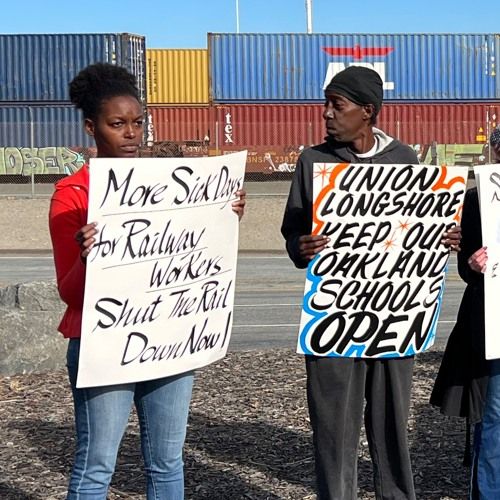Why rail workers need paid sick days
On Dec. 1, 2022, congressional Democrats and Republicans came together in a bipartisan effort to shut down the railroad workers’ planned strike. The legislation, which passed 290-137 in the House, codified a tentative agreement reached by the rail companies and the federal government to negate the autonomy of the rail workers and further suppress them under the boot of late-stage capitalism.

Rally in solidarity with railroad workers’ contract fight, with support from International Longshore and Warehouse Union (ILWU) Local 10, Oakland, California, Oct. 27. Credit: Workweek Radio
One of the most important measures rail workers are fighting for was paid sick leave days. The blatantly false secondary bill the House passed had contained seven days paid sick leave, although the rail workers’ demand was for 15. But when the measure reached the Senate, even the meager seven-day provision was dropped.
Adding sick leave of any amount would have cut into the rail companies’ profits, and they fought tooth-and-nail to deprive the striking workers any opportunity to rest up and heal themselves. Something that all human beings, no matter what their profession, deserve.
COVID-19 and flu underscore need for sick leave
While sick leave should be a human right that all workers are entitled to, not all workers have equal access to sick days, paid or unpaid. As in many things under a capitalist, materialistic society, it seems that the ruling class and the politicians have more access to sick days than workers in the industries which keep society running.
As recently as 2019, close to 100% of the top 10% of wage earners have access to paid sick leave, compared to only 25% of the lowest-paid 10%. (pewresearch.org) As far as the specific professions are concerned, over 90% of workers in management and finance have access to sick leave, which is over a third more than workers in service industries.
The U.S. government’s ruthless assault on workers’ rights comes at a time when COVID-19 and influenza cases are on the rise. At the beginning of December, there was a 32% increase in patients admitted to the hospital with the flu and a 14% increase in COVID-19 hospitalizations. (cnn.com)
COVID-19 has wreaked havoc on lower-income communities, with casualties twice as high in poor countries than in wealthier ones. This highlights how necessary sick leave is to the working class. Not only could workers stay at home and recuperate, but they could limit transmitting viruses to co-workers and make the spread more manageable.
As a wage worker, I know how valuable having paid sick leave can be. One morning I woke up with a very high fever and an overall body ache. It took all my energy and strength to get out of bed and get ready for the day. Coming into work that day, I didn’t think I had what it took to stay alert and focused. Feeling that I had no other choice, I decided to press through and work the rest of the day, headaches and sweats be damned. When I got home, all I could do was lie in bed. I didn’t have the stamina to stand nor even sit upright.
Knowing how important my well-being was, I decided not to risk anything and took a couple of sick days to rest and recuperate. Those two days were the difference between a lethargic, unfocused person and an alert, energetic one. In fact, a study found that people without paid sick leave had more trouble staying awake than those who did have sick leave. (csuohio.edu)
Having paid sick leave to recover from illness can make a huge difference in the health of an individual. It is imperative for all workers to support the rail workers in their fight for paid sick days, because a healthy workforce is a safer and more empowered workforce.

